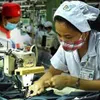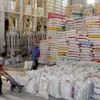Vietnamese retailers fight to maintain their share of the domestic market

The government has outlined strategies to help local retailers improve their competitiveness and establish a stronger foothold at home.
Before Thailand’s Central Group bought Big C, another Thai group TCC bought Metro Group’s Cash and Carry wholesale chain earlier this year. The transaction included all 19 wholesale stores and its related real estate portfolio for 655 million Euros. Vietnamese retail enterprises are under threat of losing in the domestic market. The Sai Gon Union of Trading Co-operatives, Saigon Co-op, was involved in the buying of Big C.
While the foreign enterprise had more advantages in the acquisition transaction, Saigon Coop has faced a lot of difficulties including obtaining an external investment license.
Over the past 9 years since joining the WTO, Vietnam has almost fully opened the retail sector, but has not yet issued sufficient policies for domestic enterprises in the integration process regarding human resources, market information, and trade mark marketing.
Diep Dung, Chairman of Saigon Co-op, said that they have suggested the government construct a national strategy for Vietnam’s retail sector development towards 2030. It should focus on developing the 20 top Vietnamese retailers to compete with foreign enterprises.
The government will adjust policies and obstacles in foreign mergers and acquisition transactions.
Beside the government strategy, retail enterprises have to reform and improve their services. According to Nguyen Tan Hoang Hau, Marketing Director of Thien Hoa Electronics and Furniture Shopping Center, the company will “continue to invest in our trademark recognition system and upgrade our electronics supermarkets in Vietnam to improve competitiveness and attract foreign investment.”
Le Thi Thanh Lam, Deputy General Director of Sai Gon Food, said “we’ll regularly introduce new products. No one can understand the taste of Vietnamese people better than Vietnamese people. We’ll take this advantage to produce suitable products at competitive prices and maintain our foothold.”
As well as retailers, producers will also have to improve product quality and reduce their prices in order to penetrate retail chains in Vietnam and abroad. Foreign retail store operators from Thailand, Japan, and the Republic of Korea have expanded their stores in Vietnam and sold an increasing number of foreign products to Vietnamese consumers.
Under free trade agreements and Vietnam’s integration commitments, more than 10,000 products will enjoy tax free benefits among ASEAN countries. Another challenge is that some Vietnamese consumers prefer foreign goods at lower prices.
Dinh Thi My Loan, President of Vietnam Retailers’ Association, shared her views “when the market is more open, enterprises have to review their production and trade plans. We have to produce what the market needs, not sell what we have.”
Economists said Vietnamese enterprises should reform production, trade, and management to produce better products at reasonable prices as the open market has been moving away from the supplier-controlled distribution networks towards retailer- controlled networks.
Tags:





